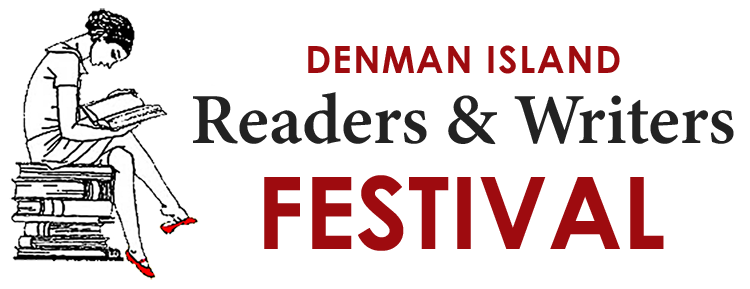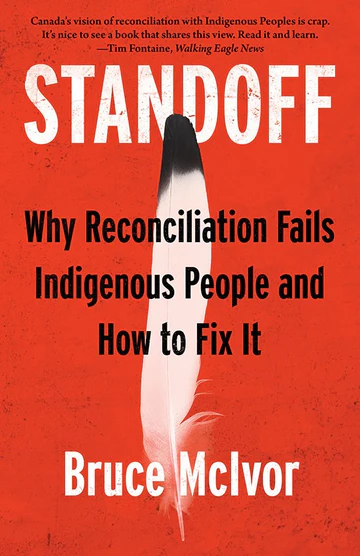Dr. Bruce McIvor | Why Reconciliation Fails Indigenous People and How to Fix It
Reviewed by: Heather NeunThe Author: Bruce McIvor is a lawyer and historian, and a partner at First Peoples Law. Bruce’s ancestors took Métis scrip at Red River in Manitoba. He is a member of the Manitoba Métis Foundation.
The Book: Bruce McIvor’s “Standoff: Why Reconciliation Fails Indigenous People and How to Fix It” is an accessible entry point for readers aiming to deepen their understanding of the denial of Indigenous rights in Canada, but don’t know where to start. Standoff takes some staying power for those without legal training, but it’s worth the effort. The book consists of a collection of essays that weave together themes of systemic racism and marginalisation, the ever-present threat of violence employed against Indigenous people in their continued oppression and displacement, and recurrent news stories of Indigenous peoples’ efforts to protect their lands and resources for future generations. The short essay style means you can easily pick up from where you left off. Recommended for all non-lawyers, and lawyers, who want to be real about the failure of reconciliation in Canada.
I was reading this book when news headlines heralded the Vatican’s long overdue repudiation of the Doctrine of Discovery. This is the racist notion that upon “discovering” them, colonising European nations acquired the underlying title to Indigenous Peoples’ lands, thereby extinguishing Indigenous Peoples’ sovereignty and their rights to benefit from their lands and decide how they will be used. McIvor’s Standoff is a timely reflection on the ways this doctrine remains embedded in Canadian law. The book sketches out how the federal government might abandon all policies, acts and laws based on this doctrine, and redress its pervasive effects.
Standoff offers compelling reflections about the continued denial of the inherent rights of Indigenous Peoples and the “massive failure” of Canada’s vision for reconciliation. The book lambastes the pretensions of politicians that talk of reconciliation but whose actions speak otherwise. McIvor hopes to advance a vital national dialogue that could help resolve this standoff over reconciliation. He offers clear summaries of the historical and legal forces that have led to this standoff. Free of legal jargon, his essays track court decisions over the last decade that have both supported and thwarted the recognition of inherent Indigenous rights and legal orders.
Other essays shed light on the steady stream of news stories about Indigenous people defending their lands and waters against extraction and environmental ruin. Drawing on deep knowledge of Canadian history and law, McIvor deftly explains legal doctrines, arguments and advances in the law, and the all-too-common dead ends that Indigenous peoples confront in litigation and negotiation.
There have been advances in the courts. The Supreme Court’s 2014 judgment in Tsilhqot’in was the first court decision to declare lands to be imbued with Aboriginal title. McIvor observes that Tsilhqot’in might have kick-started the beginning of the ‘post-denial’ era of Indigenous rights and led to the overhaul the BC government’s treaty process and Canada’s land claims policy. But when Indigenous people obtain such favourable court decisions, governments then delay their implementation or simply ignore the decisions. McIvor cites Canada’s post-Tsilhqot’in land claims policy that continues to be based on the principle of extinguishment of Indigenous title rather than its recognition.
Readers will appreciate hard-hitting pieces like “Reconciliation at the End of a Gun: The Wet’suwet’en and the RCMP” and “The Wet’suwet’en, Aboriginal Title and the Rule of Law: An Explainer:”. The latter sifts through the conflicting information that was presented to Canadians and counters the dominant narratives full of misconceptions and denialism.
Another essay critiques the BC government’s failures to adopt a different approach after its much-lauded implementation into law of the UN Declaration on the Rights of Indigenous Peoples. The international standard endorsed by Canada, UNDRIP recognizes Indigenous Peoples’ historical and legal interests in their lands. McIvor illustrates BC’s failure with examples like the continued development of Site C dam, which portends the permanent destruction of significant portions of the lands of Treaty 8 First Nations in BC, and the RCMP’s violent enforcement of the Coastal GasLink injunction against the Wet’suwet’en.
McIvor ponders whether Canada’s proposed act to implement UNDRIP (Bill C-15) will make a difference. A good question, given that successive governments have failed to fulfill their existing legal obligations. This is just one example of Canada’s failure to uphold the rule of law, something we prefer to associate with other countries, but not our own. McIvor points to successive government decisions that ignore or fail to implement advances made in Canadian law, and under international principles. He reminds us that the rule of law includes not just Canadian but Indigenous law.
Standoff offers timely reflections at a potential turning point in Canada’s face-off with its colonial past and present. It also suggests a way forward based on honesty and respect. McIvor sets out what needs to be done, if reconciliation is to be more than empty rhetoric:
- Stop trying to reconcile the rights of Indigenous peoples with the codification of the Doctrine of Discovery in Canadian law. Instead, repudiate the doctrine.
- Recognise Indigenous rights.
- Move away from our often empty, legal ‘duty to consult’ approaches and towards consent based decision-making that is grounded in an understanding that Indigenous peoples “never relinquished their right and responsibility to make decisions about their lands”.
To these ends, McIvor invites non-Indigenous Canadians to dig deeper, be courageous, and face the inevitable discomfort that will come from confronting our world views and resisting the pervasive myth of “Canada the good”. McIvor invites us to accept the challenging truth that the historical project of colonialism continues and that Canada is “fundamentally a racist state… built on denial of Indigenous Peoples’ rights and humanity”.
Our acceptance of this challenge raises the possibility of advancing a meaningful project of reconciliation based on respect for Indigenous People’s rights and legal systems and control over their lands and resources. Accepting these truths, says McIvor, will create new opportunities. Failure to accept them will mean more of the same.
Bruce is one of the exceptional writers invited to this year’s Denman Island Readers and Writers Festival (July 21-23). Come listen to him speak about his book, and discuss it in a mainstage event with Denman Island lawyer, Noah Ross.
Please fill out the form below to receive news from us.


